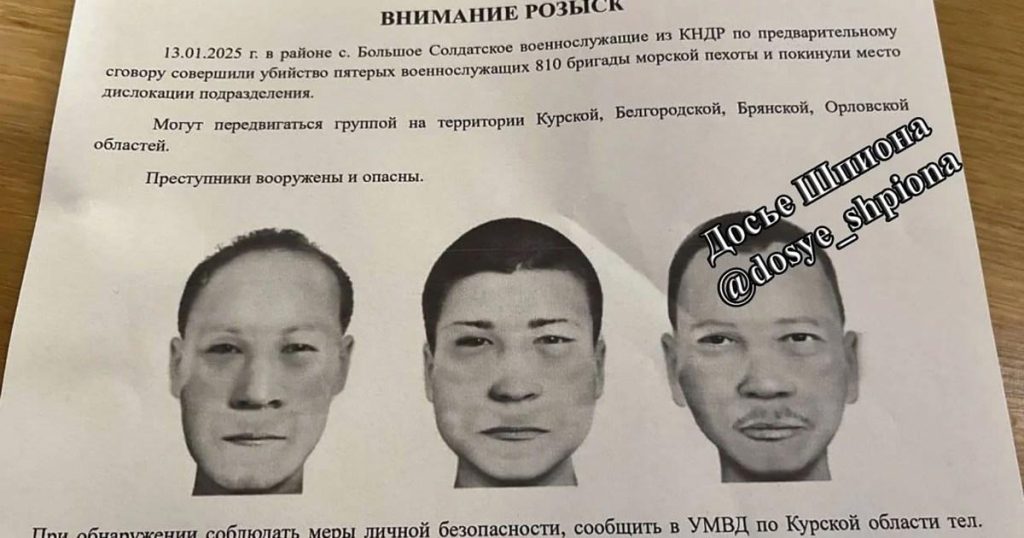The Alleged Fratricide: North Korean Soldiers Accused of Killing Russian Comrades
A chilling narrative has emerged from the fog of war, alleging a brutal act of fratricide involving North Korean soldiers fighting alongside Russian forces in Ukraine. Reports suggest that three North Korean soldiers, part of a contingent estimated to be 11,000 strong, are accused of murdering five Russian marines in a friendly fire incident. The alleged killings occurred near the village of Bolshoye Soldatskoye in the Kursk region of Russia, an area close to the Ukrainian border. Following the incident, the three North Korean soldiers reportedly fled the scene, armed with their military weapons, triggering a manhunt across multiple regions, including Kursk, Belgorod, Bryansk, and Oryol.
The victims were identified as members of the 810th Separate Marine Brigade, a unit based in Sevastopol, Crimea, a territory annexed by Russia in 2014. While the motive for the alleged killings remains unclear, speculation abounds, with some suggesting a possible case of mistaken identity or an escalation of tensions between the two allied forces. The incident, if confirmed, raises serious questions about the cohesion and command structure within the combined Russian-North Korean forces operating in the region.
The Information Void and the Kremlin’s Silence
Adding to the complexity of the situation is the apparent lack of official acknowledgement or comment from the Russian Ministry of Defence. This silence has fueled speculation of a potential cover-up, particularly given Russia’s previous denials of North Korean involvement in the Ukraine conflict. The absence of official confirmation, coupled with the reliance on unverified reports and online sources, underscores the challenges in obtaining accurate information from the war zone. Independent verification of the incident remains elusive, highlighting the information vacuum that often characterizes conflicts, especially those involving sensitive geopolitical dynamics.
The primary source of information about the alleged incident is a Telegram channel known as "The Spy Dossier," which claims to have links to Russian intelligence. The channel circulated a poster displaying photographs of the three North Korean soldiers wanted in connection with the killings. However, the authenticity of the poster and the reliability of the information provided by the channel have yet to be independently verified. This lack of corroboration casts a shadow of doubt over the narrative, further emphasizing the need for caution in interpreting information originating from such sources.
The North Korean Presence in Ukraine: A Controversial Alliance
The alleged incident comes amidst reports of a significant North Korean military presence in Ukraine, supporting Russia’s war effort. While the exact number of North Korean troops deployed remains uncertain, estimates range in the thousands. Their involvement marks a controversial development in the conflict, raising concerns about the internationalization of the war and the potential for further escalation.
Reports of North Korean casualties in the conflict have also surfaced, with some estimates suggesting significant losses, especially from Ukrainian drone strikes. These reports, if accurate, paint a grim picture of the human cost of the war for North Korean soldiers fighting far from home in a foreign conflict.
The Broader Context: Geopolitical Implications and Humanitarian Concerns
The alleged incident and the broader context of North Korean involvement in the Ukraine war raise several critical questions. Firstly, it underscores the complex web of alliances and partnerships forged in times of conflict, often involving actors with disparate interests and motivations. The Russia-North Korea alliance, while seemingly opportunistic, raises questions about the long-term stability of such partnerships and the potential for unforeseen consequences.
Secondly, the incident highlights the humanitarian cost of war, extending beyond the immediate belligerents. The reported casualties among North Korean soldiers underscore the human toll of conflicts, often borne by individuals with little say in the political decisions that drive them.
Finally, the alleged incident and the ongoing presence of North Korean troops in Ukraine raise concerns about the potential for further escalation of the conflict. The introduction of foreign fighters into the war zone adds another layer of complexity, increasing the risk of miscalculation and unintended consequences.
The Need for Verification and Accountability
The alleged killing of Russian soldiers by North Korean troops, while unverified, highlights the critical need for independent investigations and accountability in wartime. The fog of war often obscures the truth, making it difficult to ascertain the facts on the ground. However, credible and impartial investigations are essential to establish the truth, determine responsibility, and hold those accountable for any wrongdoing.
In the absence of official confirmation and independent verification, the allegations surrounding the incident should be treated with caution. Nevertheless, the reports raise serious concerns about the conduct of the war and the potential for further violence. The international community must demand transparency and accountability from all parties involved in the conflict to prevent further escalation and mitigate the human cost of the war.
The Uncertain Future: Implications for Regional Stability
The unfolding events in Ukraine, including the alleged incident involving North Korean soldiers, have significant implications for regional stability. The increasing involvement of external actors in the conflict raises the risk of unintended consequences and further escalation. The international community must work together to de-escalate tensions, promote dialogue, and seek a peaceful resolution to the conflict. Failure to do so could have far-reaching and potentially devastating consequences for the region and beyond.











